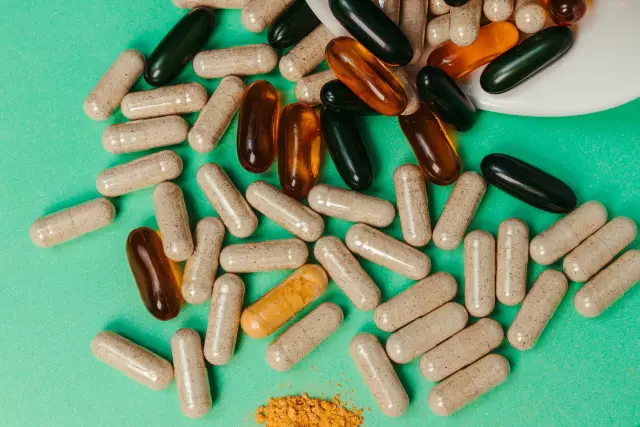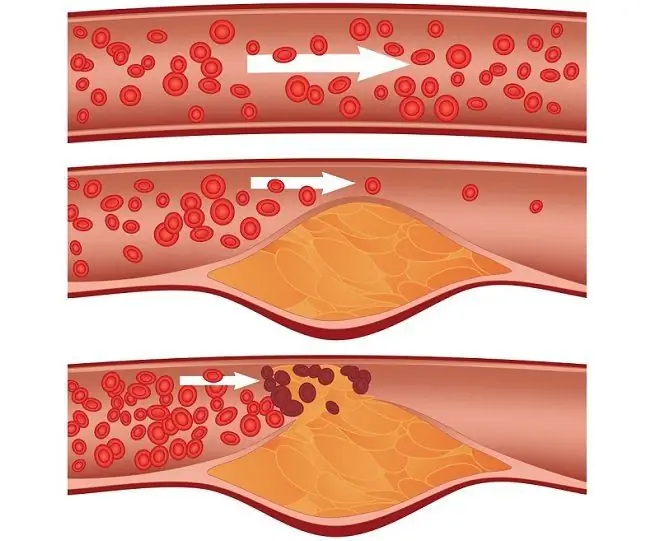- Author Rachel Wainwright wainwright@abchealthonline.com.
- Public 2023-12-15 07:39.
- Last modified 2025-11-02 20:14.
Hyperuricemia
Hyperuricemia is considered to be a condition in which the level of uric acid in the blood exceeds the limit values. Normally, the concentration of uric acid in the blood should be in the range of 240-400 microns / l.
Causes of hyperuricemia

Hyperuricemia can be caused by two factors:
- excessive production of uric acid (metabolic or metabolic hyperuricemia);
- impaired excretion of uric acid by the kidneys (renal hyperuricemia).
The cause of renal hyperuricemia can be both hereditary and acquired. In any case, the trigger is a violation of the filtration-tubular function of the kidneys. Acquired hyperuricemia, as a rule, occurs already in old age due to sclerosis of the renal vessels (when scar tissue grows in the walls of the vessels, leading to narrowing of the vascular lumens). Also, acquired hyperuricemia can be a consequence of atherosclerosis, diabetes mellitus, hypertension, and sometimes prolonged and unreasonable use of certain medications (in particular diuretics and aspirin).
Constant increased levels of uric acid in the urine first contribute to the formation of sand in the kidneys, and subsequently stones (urolithiasis develops). Often, a consequence of a violation of purine metabolism is gouty arthritis (gout) - inflammation of the joints of a chronic nature, which is accompanied by severe pain and deformation of the joints.
In general, gout has been considered an exclusively hereditary disease for many years. However, in recent years, numerous studies have been carried out, according to which information about gout and the reasons for its development has expanded significantly.
Thus, it is already known that gouty arthritis and urate stones occur against the background of impaired purine metabolism.
Research in recent years has also shown that impaired purine metabolism can contribute to the development of a malfunction of the beta cells of the pancreas, resulting in the inability of these cells to synthesize insulin. Thus, the combination of such diseases as diabetes mellitus, gout and urolithiasis is no longer surprising for anyone.
Often, hyperuricemia develops as a result of alcohol abuse, prolonged use of drugs (diuretics, salicylates). The increased concentration of uric acid in the blood leads to the fact that it, getting into the articular fluid, where acid crystals form clusters in the periarticular tissues and joints, destroys the cartilage and bone tissues, causing their deformation and inflammation.
Hyperuricemia symptoms
The most important symptom of hyperuricemia is an elevated blood uric acid level. Naturally, for the diagnosis of this disease, it is necessary to donate blood for biochemical analysis.
If the results of the analysis show that the patient is at risk, that is, the level of uric acid has boundary values, it is recommended that he immediately switch to a diet for hyperuricemia.
Hyperuricemia treatment
Doctors use several approaches to treat hyperuricemia. First of all, it is necessary to follow a diet for hyperuricemia, which implies a complete exclusion from the diet of foods high in purines. Thus, the following foods will have to be excluded from the diet:
- alcoholic beverages and beer (sometimes a small amount of dry wine is allowed);
- fish and meat dishes baked, fried and stewed;
- rich fish and meat soups;
- heart, kidneys, liver, sausages, various smoked meats, canned food and legumes (peas, beans, soy).
Also, a diet for hyperuricemia involves limiting the use of spinach, sorrel, cheese, radish, cocoa, chocolate, cauliflower. But the following products are welcome:
- chicken, turkey, rabbit meat;
- various vegetarian soups and first courses cooked in the "second" fish or meat broth;
- dairy and fermented milk products;
- berries, herbs, vegetables and fruits.
Particular preference in the treatment of hyperuricemia should be given to fruits and vegetables rich in potassium (eggplant, pumpkin, cabbage, cucumbers, carrots, bell peppers, apricots, green peas, grapes, melons, pears, apples). Of the berries, the most useful will be bright red, blue and dark (sweet cherries, cherries, cranberries, blueberries, viburnum, hawthorn, lingonberry). All of them are rich in substances that help to reduce the concentration of uric acid in the blood.

When treating hyperuricemia, you should drink about 2-2.5 liters of water daily. A large amount of fluid dilutes the urine and is an excellent prevention of kidney stones. Spring water is best; it is useful to add a little lemon juice, lingonberry or cranberry juice to it.
Fasting days must be done once a week.
In the drug treatment of hyperuricemia, patients are prescribed probenecid, which helps to reduce uric acid. For symptoms of hyperuricemia, doctors also make extensive use of allopurinol, a xanthine oxidase inhibitor.
YouTube video related to the article:
The information is generalized and provided for informational purposes only. At the first sign of illness, see your doctor. Self-medication is hazardous to health!






